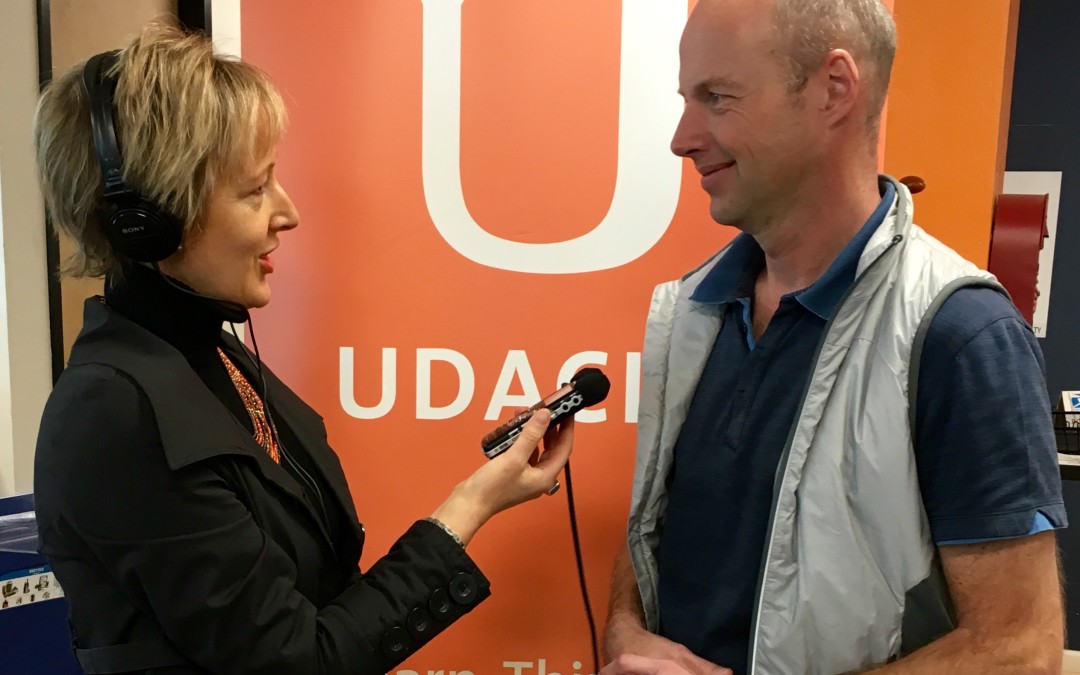
Mar 9, 2016 | China - what we can learn, Education, Entrepreneurship
By Alison van Diggelen, host of Fresh Dialogues
This week, artificial intelligence (AI) reached a significant milestone. For the first time, Google’s DeepMind unit beat the legendary champion of Go, a highly complex board game. Machines are now being built with self-learning mechanisms that simulate the neural network of the human brain. What does this mean for the future of AI and its ability to replace humans in the workplace? The future just got closer.
Sebastian Thrun is well known for being a pioneer in artificial intelligence and autonomous cars, but is now laser focused on making sure online education bridges the skills gap, via his company, Udacity. Here’s what he said recently about AI:
“Udacity is my response to the development of AI. The mission I have to educate everybody is really an attempt to delay what AI will eventually do to us, because I honestly believe people should have a chance.” Sebastian Thrun*
I sat down with Thrun at the company’s headquarters in Silicon Valley to explore his grand vision and audacious promises. Last year, Udacity raised $105 million in venture funding, based on a valuation of $1 billion. Is this another overpriced Silicon Valley unicorn or is the value justified?
First, a little back story: In 2012, Thrun was astounded at the massive number of people signing up for his Stanford AI course online course: 160,000 in all, mostly from outside the United States. He quickly realized that online education has the potential to make learning affordable and reach millions globally.
“Nothing has more potential to unlock a billion more brains to solve the world’s biggest problems,” wrote Tom Friedman in 2013. But of course, his and Thrun’s rosy predictions couldn’t happen overnight. The online learning business had some serious teething problems with high drop out rates, and dismal failure rates. But today, the future of online education is looking brighter.
There are now countless online education companies globally. The big three are: Coursera (a Stanford startup) which now boasts 15 million students; EdX (affiliated with MIT and Harvard) with over 5 million users; and Udacity, 4 million.
Since Udacity’s high profile failure at San Jose State, the company has refocused its online courses and recently partnered with Google, AT&T and Amazon to design “nanodegrees” tailored to the needs of tech companies. Thrun is so bullish about the market value of these 4-12 month nanodegrees, which offer project based learning, that he’s offering a money-back job guarantee.
“For certain Nanodegree programs we’re offering all your tuition back unless we or you find yourself a job within the first 6 months of graduation. For the student, the education is basically free. … These are jobs that pay $80,000 or more, maybe $120,000 in Silicon Valley. With the first month’s salary they can recoup all tuition or we just pay them tuition back…“ Sebastian Thrun, CEO Udacity
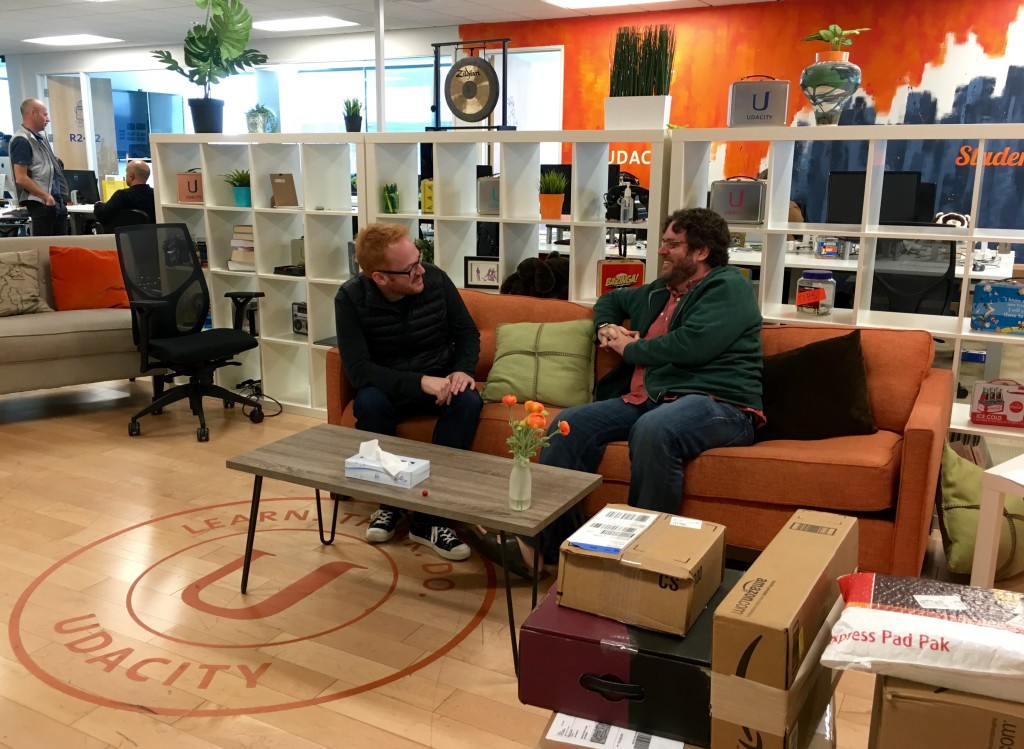 Here are more highlights from my conversation with Sebastian Thrun:
Here are more highlights from my conversation with Sebastian Thrun:
On Redefining Education
I think education has to shrink: We have to stop thinking of education as a four or six year investment you can only afford once in your life. We have think of education as a lifelong thing, to shrink the size of our degrees and make education a daily habit, the same way we brush our teeth every day. We have to redefine what education really means.
On Access to Education
Elite colleges like Stanford are extremely inaccessible. They’re failing in their mission to provide access. The Udacity recipe is exactly the opposite – we want to reach everyone and have no admission hurdle. We want to be able to educate people. We do this today in Ghana, in Sub Saharan Africa, in Bangladesh, in China, around the world. If we do this, we can have a substantial impact on the world’s GDP because so much talent is under utilized because of lack of education. If we give people in Syria the same chances as kids in America have, it’s going to be spectacular.
On Persuading Skeptics
The question is still open how much a nanodegree will become gold standard…this takes time. But some companies earmark jobs specifically for us, give us preferential treatment. Google even invites the top nanodegree finishers on campus in Mountain View to meet their recruiters, which they don’t do with other universities….
And others are still skeptical. People are hired on conventional credentials and many of our students are career shifters. They don’t have the 20 years of history that a seasoned person has.
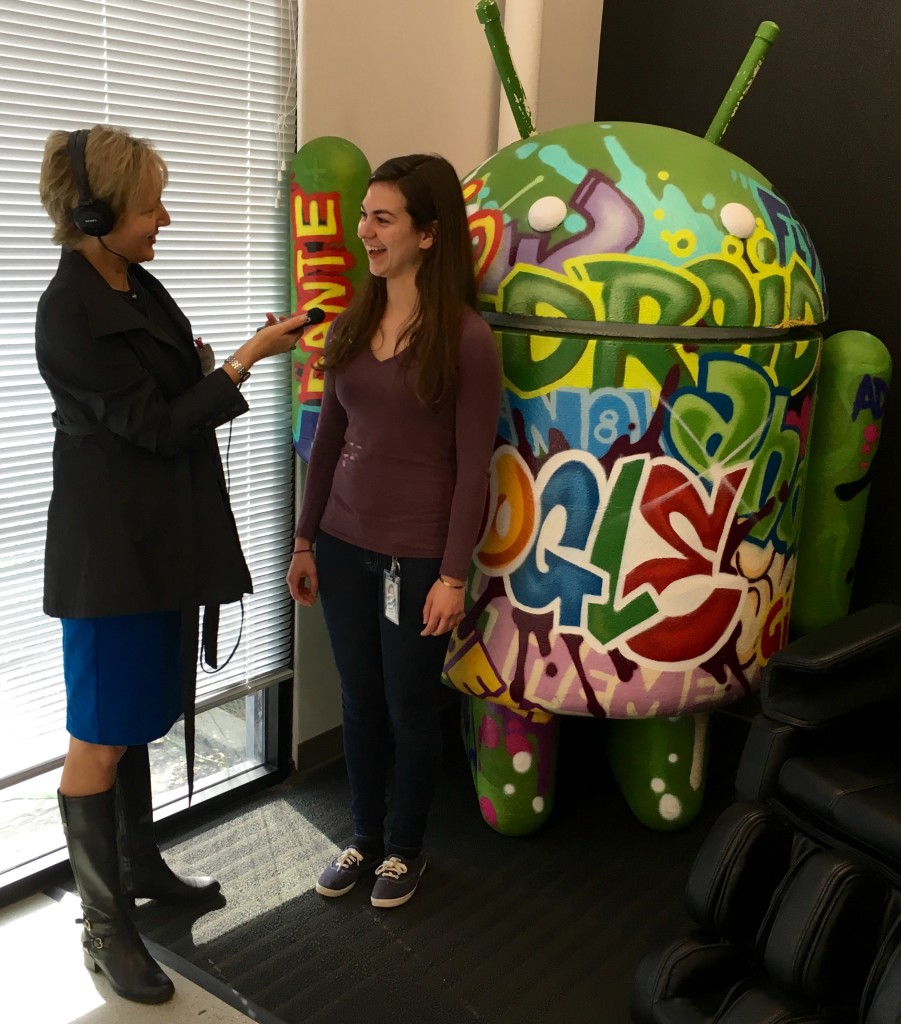
Meet Kelly Marchisio
Last year, Marchisio got a promoted from customer service to “web solutions” engineering at Google after completing Udacity’s nanodegree. She said of her 6-month intensive program: “It’s industry relevant, fun…maybe I’m just a nerd but I really enjoy spending my weekends working through programming materials.”
Marchisio adds, “I’d guess there are more women in a Udacity program than there would be in an academic course…an online environment feels more safe…less social pressure. You can try things on your own, make mistakes and not feel embarrassed about it.”
On Udacity’s China Expansion
China has 20 million college students. It’s huge. It has a thriving new middle class and can’t keep up with brick and mortar university buildup to meet the demands of these people.
I want to go there and tell them look: You can become a Silicon Valley trained Android iOS engineer, a data scientist, a cyber security engineer, even a self driving car engineer for almost no money in about half a year.
Note: Udacity currently has an office in China and plans to roll out its learning platform, by replicating Google tools and building its own server farm in the second quarter of 2016.
On his Moonshot, 50 Year Vision
Conventional degrees will be gone. We’ll abandon the idea of education first, and then work.
I see people starting work straight out of high school and bringing experiences, deficiencies, desires back into education. We’ll have a life where education and work is on all the time. The old fashioned – you get born, ed, work, retire and die is obsolete. We have to do all these things at the same time, with the exception of death of course!
We have to learn to play, to get educated. We have think of life as a process, not as an accomplishment, but have a growth mindset for our lives. That will be the case because 50 years from now, things will be moving so insanely fast that to stay current, a college education will expire faster than its course.
***
In conclusion, it looks like Udacity has found a sustainable business model by focusing on the IT job market. The company currently has about 11,000 students enrolled in its nanodegree programs, each paying approximately $200/month, producing an estimated annual revenue of over $26 million. If Thrun can continue to drive rapid growth, compete effectively against the growing competition and replicate the company’s current success as it expands in China, then perhaps that $1 billion valuation doesn’t look quite so make-believe.
*Interesting to note that although Thrun offers online education as a way to “delay” the massive job losses that AI will eventually produce, Udacity’s top listed nanodegree is…you guessed it: machine learning. Otherwise known as AI.

Jul 14, 2015 | BBC World Service, China - what we can learn, Inspiring Women
By Alison van Diggelen, host of Fresh Dialogues
Six years ago, she founded the first community supported agriculture (CSA) farm in China. Today, organic farming pioneer, Shi Yan and her team serve hundreds of city dwellers in Beijing; and her thriving Shared Harvest Farm has inspired dozens of CSAs across China.
Shi Yan is one of a growing group of farmers in China who are bucking the trend of young workers abandoning agriculture and being drawn to cities like Beijing, one of the world’s largest conurbations. By helping bring young people back to the land and serving the growing demand for sustainable practices and organic food in China, Shi Yan has attracted the attention of major media outlets, NPR and the BBC.
.
On July 10th, I was invited to join BBC host,
Fergus Nicoll on
BBC World Service program,
Business Matters to interview Shi Yan about her mission; and explore the economic and social drivers for organic produce in China.
.
Fergus Nicoll: We are going to devote much of the second half of the programme to environmental issues. We’ll hear about Community Supported Agriculture in China and our guest
Shi Yan is with us from Beijing…Let’s welcome Alison van Diggelen of Fresh Dialogues. Alison, we’re going to leave your microphone open.
Alison, as anybody who knows her website
Fresh Dialogues, is a professional asker of questions. Alison: jump in when you fancy and we’ll make this a three-way discussion.
Shi Yan, tell us a bit about Shared Harvest…and the concept of community supported agriculture.
Shi Yan: Our farm
Shared Harvest is located in
Tongzhou district of Beijing. Right now we have about 15 hectares of land we rented for 15 years. Most of our produce is vegetables and we also have almost 2000 chickens and 50 pigs. Every week we deliver our produce directly to our members. CSA is a way that links the farmers and the consumers directly and
we build the trust between the consumers and the farmers. Right now we have about 600 families in Beijing; most of their food comes from our farm.
Fergus Nicoll: Is that entirely organic or are you allowed to sneak in some pesticides or herbicides?
Shi Yan: Actually we call our produce “organically produced” because we don’t have the organic certification but we don’t use any chemical fertilizer and pesticides.
Fergus Nicoll: What about the market for that, because in different countries the market for organic food has waned and grown depending on economic circumstances…a growing middle class wants a purer production mechanism…even if it’s not organic with a capital “O.”
Shi Yan: In China in the last seven years, organic agriculture is growing pretty fast because of issues related to
food safety, environmental issues. When I started in 2009…very few consumers knew about the concept of CSA, but right now a lot of people in Beijing know this model.
.
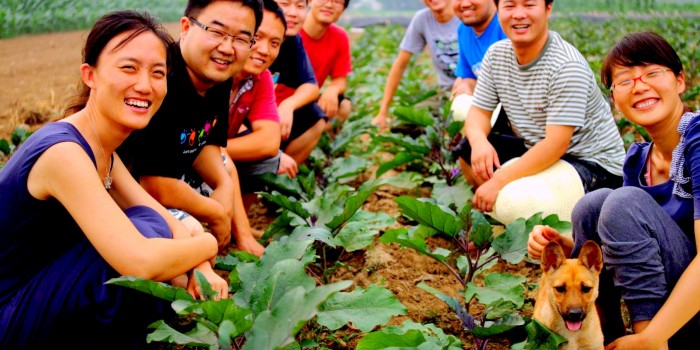 .
..
.
.
.
.
.
.
.
.
.
.
.
.
.
.
Fergus Nicoll: A lot of people who buy organic face criticism from people who don’t. They’ll say: I go to the supermarket and I see a box of six perfectly produced apples, they all look 100% identical like clones, selling for “X” and next to that are organic apples that are kind of lumpy, they’re all different shapes and they cost “X plus” Do you ever get that complaint?
Shi Yan: If you order the vegetables from a CSA farm (in China) the price is about 2/3rds of the price in the supermarket. Right now, consumers care more about the food quality rather than the price. A lot of them are rethinking our food system because if you only look at the appearance of the fruit or vegetables…a lot of food (in non-organic farms) is wasted because of their appearance.
Alison van Diggelen: I’m curious about the drivers in China. Do you have a feel for your consumers…Is the
impact of pesticides etc. on the environment is that a major driver? Or would you say the main drivers are food scares and the quality of produce?
Shi Yan: At the beginning the food safety issues…a lot of food scandals happened and people started looking for healthy food. But later they found the deep reason is not the market or the food itself, but a lot of problems happened in the rural (areas)…food comes from the village and in last 10 years, fewer and fewer young people stay in the village. Right now most of the farmers growing the food are above sixty years old, struggling for their livelihood. Can they really take the responsibility of producing healthy food? It’s a big problem.
Fergus Nicoll: Can I ask you about “labor shifting” consumers actually doing the farming themselves? Because they’re extremely motivated but may not know the best way to do it.
Shi Yan: We have two models: one part you can order our produce, we will deliver to your door. (Or) you can rent a piece of land: 30 square meters of land, as a farm. Every week you can come to your farm, grow your own food.
Alison van Diggelen: I’m curious about how you’re delivering your food. Are you using electric cars, non polluting cars, delivery trucks?
Shi Yan: We use conventional small vans.
Fergus Nicoll: In the US, if I go and see friends in Davis, I know when we go down to the farmers market, there’ll be really good stuff. This is relatively well established, certainly in California?
.
Alison van Diggelen: Absolutely, yes,
CSAs are very established here, since the 1980’s. Here’s an interesting anecdote for you, Fergus: I’ve been a subscriber to a local CSA called
Planet Organics and just this month they’ve had to close up shop after 19 years. They’ve been squeezed out by major players. Walmart is getting into the organic food business. Wholefoods has been there a while. It’s becoming so mainstream that it’s hard for these CSAs to compete.
Fergus Nicoll: So they’re getting priced out of the market…
.
To be continued.
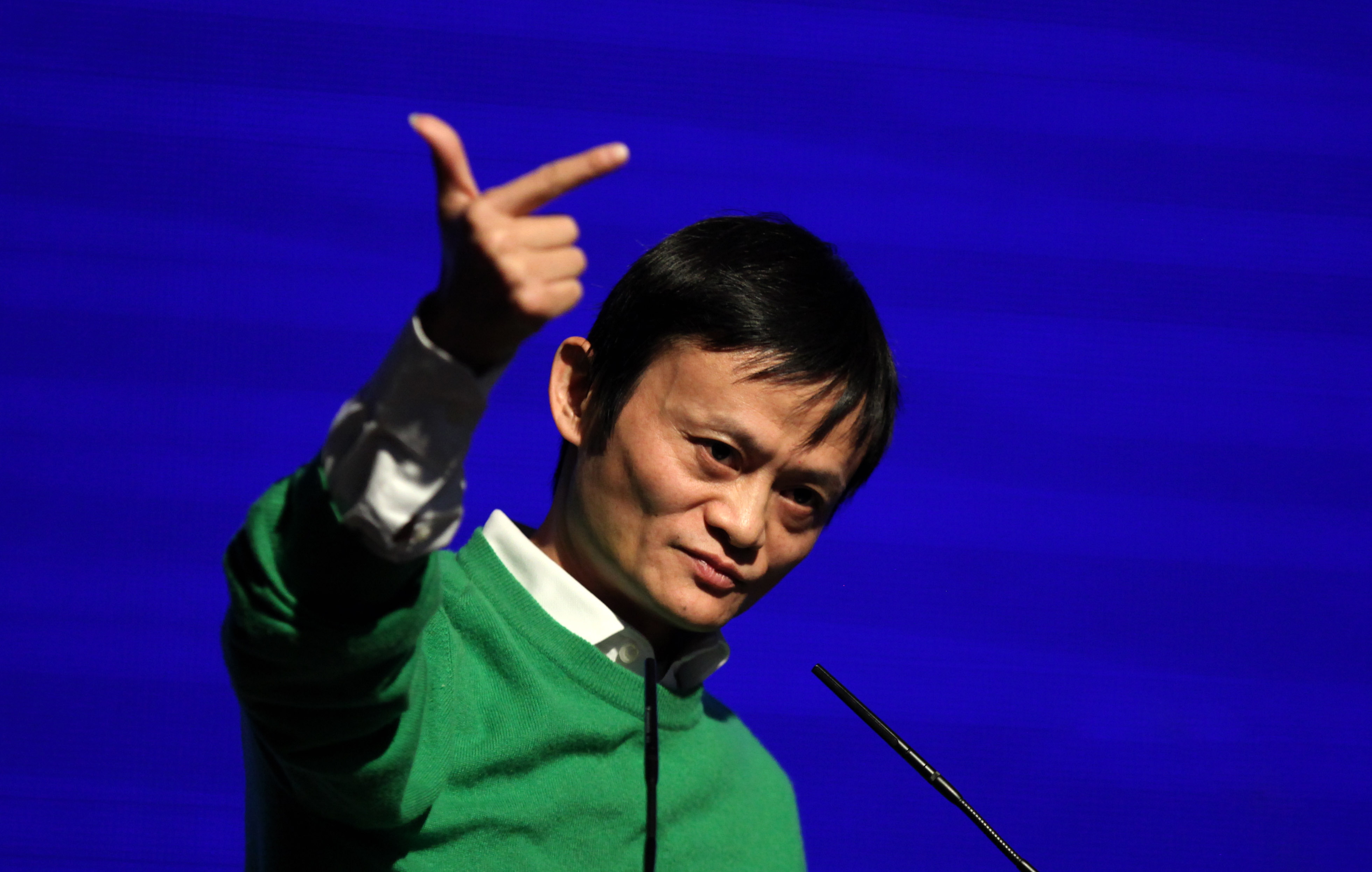
Sep 26, 2014 | BBC World Service, China - what we can learn
By Alison van Diggelen, host of Fresh Dialogues
Jack Ma may be the richest man in China, but he’s also one of the greenest. Or is headed in that direction. He has commented publicly on China’s serious pollution and said that it’s a problem that “must be solved.” The Ma man is putting his money where his mouth is (see below for details).
Since 2009 he’s served as the Chairman of the Board on the Nature Conservancy’s China program and says, “Our challenge is to help more people to make healthy money, “sustainable money,” money that is not only good for themselves but also good for the society.”
So what’s behind Jack Ma’s environmental conscience? With vast wealth comes the ability to take a longer term view of the world:
“Most companies, when they’re doing good, they enjoy today’s wonderful life. They don’t worry about five years later—but I worry about five years later,” says Jack Ma. “I think one thing’s for sure — China’s environment will get better in 10 or 20 years. Business people like myself are beginning to pay attention to social issues including the environment and taking action and really treating this issue very seriously. And we’re doing it not for P.R. reasons, but because we know it is important. We know it is serious and that if we don’t take action, it will hurt ourselves, our children and our families.”
McDowall: Our guest is Business Matters regular, Alison van Diggelen. Among her many talents, Alison is an acclaimed interviewer and is host of the Fresh Dialogues series, which you can find online, and which features experts on green technology, sustainable enterprise, celebrities and inspirational women… Alison, good afternoon to you in the Golden State. Can we talk for a minute about Alibaba? What do you make of this chap Jack Ma?
van Diggelen: Well I’m quite impressed by Jack Ma. 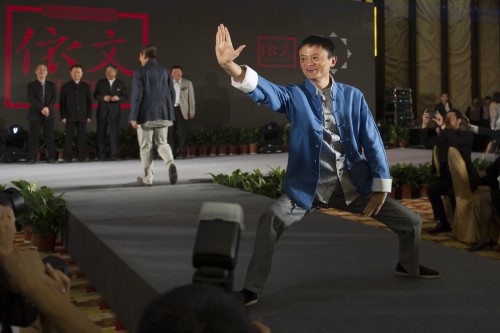
Of course, I’m always looking for the environmental, green angle as you mentioned earlier Mike. And he’s probably made enough money for a small country to live on, so he’s really turning his attention to the environment. He’s actually a major player in putting the attention on China’s environment. Its really bad: air pollution, water pollution. So I understand he’s putting 0.3% of the revenues from Alibaba into environmental causes, which I say: three cheers to that! (Reuters reports Alibaba’s revenues were $2.4Bn in the last quarter).
McDowall: Point three percent? Mind you, the revenues are enormous.
van Diggelen: Yes, absolutely. That’s probably a good tranche of money there.
McDowall: So he’s obviously someone we’re going to be seeing a lot more of in the future. He appears to be keen to raise his profile internationally. He’s obviously very well known in China and you know, ringing the bell on Wall Street…Yahoo was a big investor. We’re going to be seeing a lot more of this guy.
van Diggelen: I think a lot of people…the froth and the excitement…part of the reason for that is that it’s an opportunity for global investors to buy into China’s growth and as everyone knows that is just poised to keep growing. I think only half of the Chinese population is online, so there’s a lot of growth potential there.
McDowall: Sure. We’ll keep watching….
Keep listening to our conversation as we discuss: The Scottish referendum, Larry Ellison’s retirement and why the Ig Nobel Prizes will make you laugh, then make you think.
You can listen to other Fresh Dialogues BBC Conversations here where we discuss: the future of driverless cars, Apple’s green credentials, Tesla’s new gigafactory and many more topics.

Jul 31, 2014 | China - what we can learn, Electric Vehicles
By Alison van Diggelen, host of Fresh Dialogues
I just finished a conference call with Elon Musk re Tesla Motors’ latest Q2 2014 financial results. Beyond the big headlines that Tesla is on track for over 35,000 deliveries in 2014 and expects to build more than 60,000 in 2015, here are highlights culled from @FreshDialogues Twitter feed and other attentive Tesla watchers, including @danahull & @katiefehren:
 Alison van Diggelen @FreshDialogues
Alison van Diggelen @FreshDialogues
On the Tesla Gigafactory
Tesla
@GovSandoval: Elon Musk says the ball is in your court, writes @danahull
Battery Technology will be next generation soon at
The batteries that will come from Tesla’s gigafactory will have improvements in chemistry, higher energy density and optimized shape & size writes @katiefehren
On the Tesla Factory in Fremont
New Model S/Model X assembly line begins operation next week says
In 2015, production of 1000 units/week expected
TESLA
On Tesla Motors in China
Demand for Tesla Model S in
China’s policy re charging stations specs and EV incentives not a problem “We expect to fit within sales tax exemptions” says
On Tesla’s strict diet
Finally, Elon Musk admits #Tesla is on a diet: “losing 1/4lb here, 1/2 lb there” This weight loss impacts range #ModelS #EV
On Climate Change
Awesome that Elon Musk still willing to bring it all back to carbon emissions and climate change. Despite wealth creation, & cool factor writes @katiefehren
On Tesla vs Apple (the comparisons won’t go away!)
.@ElonMusk humblebrag on the success of stores: “Our sales per square foot are double that of Apple.”
More on Tesla from Dana Hull here
More on Tesla from Katie Fehrenbacher here
More on Tesla from Fresh Dialogues here
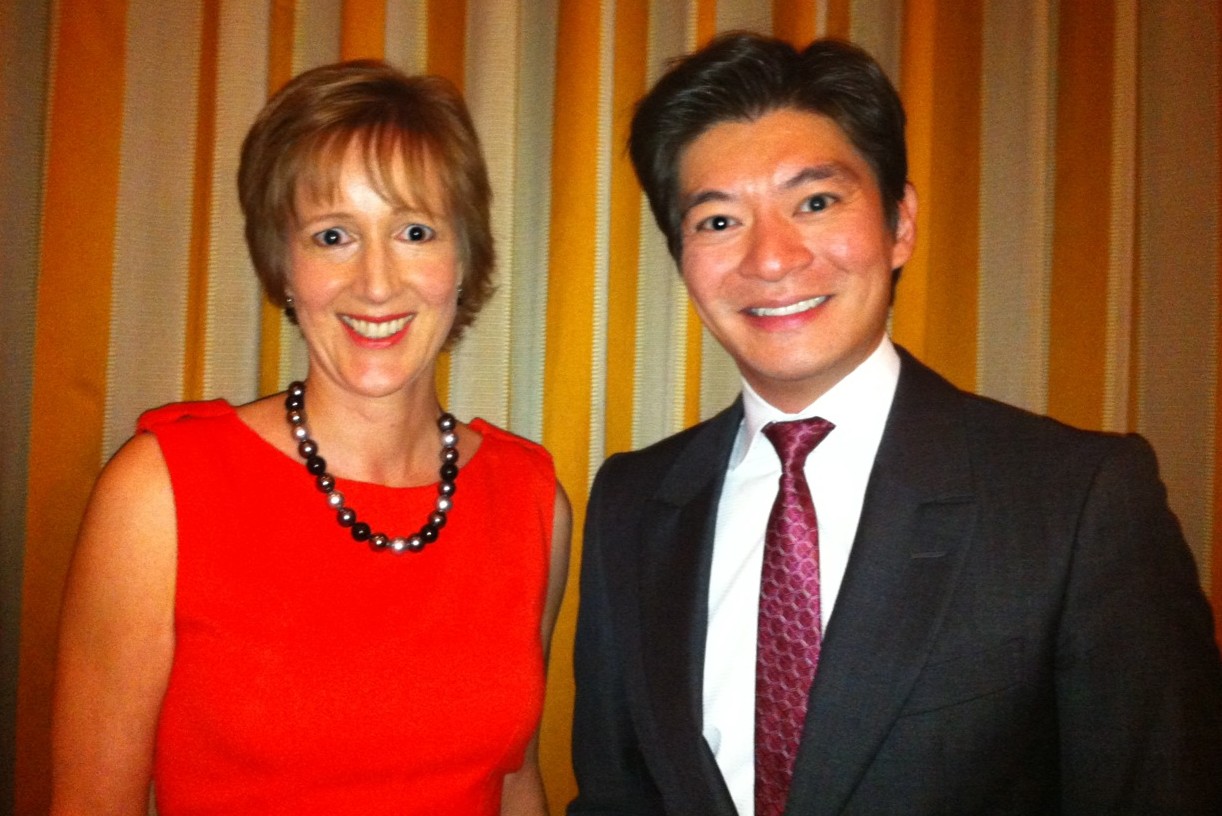
May 5, 2014 | China - what we can learn, Electric Vehicles, Storage, Technology, Venture Capital & Finance
By Alison van Diggelen, host of Fresh Dialogues
It’s no secret that cleantech has taken a bashing in the last few years, yet Andrew Chung, a partner at Khosla Ventures is still bullish about the sector’s prospects and convinced that it makes sense long-term, both domestically and globally. During our recent hour-long conversation, he admits that “keeping the cleantech fire burning” is the first thing he thinks about when he wakes in the morning.
“The number one thing is to ensure the cleantech industry continues to survive and thrive,” says Chung. He cites several companies in his portfolio that recently raised large rounds at strong valuations.
Keeping the fire burning? It’s curious imagery for someone focused on clean energy; and technologies that lower our carbon footprint. I imagine him cheerfully stoking a bonfire, plumes of black smoke filling the air.
“Would you like to qualify that?” I ask.
He chuckles, “Yes…we would capture the carbon created by the fire and transform it into something else.”
It’s a fitting segue into one of his favorite investments: LanzaTech, a company that happens to do just that. It takes carbon capture one step further, capturing waste gases like carbon monoxide from heavily polluting steel plants and converting them into “valuable fuel and chemicals.”
He calls it one of his Black Swans – highly improbable investments, that are not incremental improvements on business as usual, but giant technological leaps.
“This is cleantech done right,” Chung says. “The technology is so compelling.”
So compelling that the company recently announced a joint venture with Baosteel, a major steelmaker in China, which is investing in a new commercial facility due to come online in 2015. LanzaTech’s zero capital contribution to the deal means it can continue to scale up and pursue other partnerships in Japan, Europe, India and Russia.
I was curious to learn who helped with the initial discussions to broker the deal? None other than former British Prime Minister, Tony Blair. Those paying close attention to Khosla Ventures will remember he joined the team as a strategic advisor in 2010.
So what makes it such a compelling deal? Chung calls it a confluence of events. The blanket of smoke over Shanghai being a palpable one, leading to pressure from the Chinese government on major polluters like steel makers to clean up their act. There’s also the global ambition of many Chinese businesses who view such partnerships as strategic moves.
Societal tensions add to the pressure to solve China’s huge environmental problem. Even Jack Ma, China’s Andrew Carnegie is focusing his new philanthropic trust on health and the environment.
CONSPICUOUS ABSENCE
You’ll notice that the United States is conspicuously absent from LanzaTech’s partnership list. That fact is also at the top of Chung’s mind. Several of the potentially transformative technology companies he backs are finding it easier to get global partners than American ones.
“How do we communicate this message to D.C.?” says Chung. “If technology is not supported here, it will leave our shores.”
Chung feels the regulatory environment means that American companies are more complacent and have less appetite to take risks. He cites the U.S. car industry where employees get bonuses whether or not they achieve product improvements.
“It needs a regulatory push to compel them to take greater risk,” says Chung. “We don’t have the dire need like in China where (almost) 1 million people are dying of pollution every year.”
KINDRED SPIRITS OF ELON MUSK
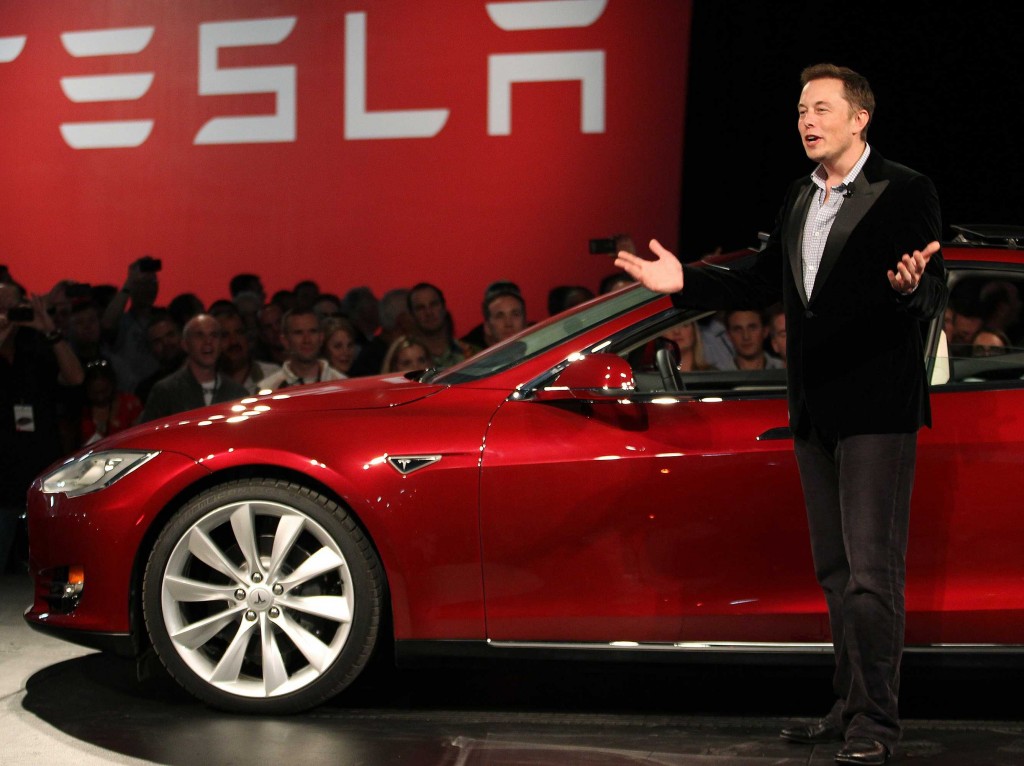 Talking of risk taking, Chung sees himself and his boss Vinod Khosla as kindred spirits of Elon Musk, who staked all his PayPal wealth on transforming the electric car sector with Tesla Motors.
Talking of risk taking, Chung sees himself and his boss Vinod Khosla as kindred spirits of Elon Musk, who staked all his PayPal wealth on transforming the electric car sector with Tesla Motors.
“It’s a major cleantech success story,” says Chung. “Elon deserves a lot of credit…he stepped on the gas when others were giving up.”
What makes them kindred spirits? It’s more than just their strong belief in technology explains Chung. He quotes Irish playwright and cofounder of the London School of Economics, George Bernard Shaw:
“All progress depends on the unreasonable man.”
“So are you and Vinod Khosla unreasonable?” I ask.
Chung laughs. “We are contrarians!” he says. “We’re willing to do what it takes.”
He points to Khosla’s investment in Ecomotors, an internal combustion engine targetting energy efficiency gains of up to 50%. The company also has backing from Bill Gates and entered into two joint venture partnerships to build plants in China, deals involving hundreds of millions of dollars. He anticipates 200,000 engines for cars and diesel generators will roll off the production lines by the end of 2016.
“We’re addressing the transport problem from both angles,” says Chung. “We are focused on the electric revolution…battery technology investments. EcoMotors is a hedge to reflect the 99% (of the transport sector) that’s not yet electricity…electric vehicle infrastructure is still a challenge.”
SINGING FOR THE WORLD


 We finally touch on what Chung calls his “secret identity,” his singing career. A finalist in Hong Kong’s version of American Idol, Chung says he has no regrets about choosing business over a singing career. Although he enjoys “bringing joy” to an audience, he’s very aware that it’s fleeting. Such momentary joy pales in comparison to his goal of having a major societal impact, or as he puts it, “Enabling 5 billion people to live like 1 billion do now.”
We finally touch on what Chung calls his “secret identity,” his singing career. A finalist in Hong Kong’s version of American Idol, Chung says he has no regrets about choosing business over a singing career. Although he enjoys “bringing joy” to an audience, he’s very aware that it’s fleeting. Such momentary joy pales in comparison to his goal of having a major societal impact, or as he puts it, “Enabling 5 billion people to live like 1 billion do now.”
Chung plans to continue singing the praises of disruptive cleantech innovation. He’s firmly committed to keeping that cleantech fire burning.
See a Fresh Dialogues interview with Andrew Chung

Apr 23, 2014 | BBC World Service, China - what we can learn, Clean Tech, Solar Energy
By Alison van Diggelen, host of Fresh Dialogues
Yesterday, I was invited to join the live BBC World Service show, Business Matters to discuss Apple’s green manifesto and its rivalry with Samsung. I was interviewed by the BBC’s talented Manuela Saragosa. Here’s a transcript of the highlights. Listen to the full interview here (green discussion starts at 26:00).
Saragosa: It was Earth Day on Tuesday… there’s been no dimming of the lights here at the BBC…but technology giant, Apple has been laying out its green manifesto to mark Earth Day. The company’s CEO Tim Cook put out a video, announcing a new scheme that allows any product made by Apple to be returned to the company for recycling.
Our guest, Alison van Diggelen is in California’s Silicon Valley. Alison, green business issues are your thing, what do you make of Apple’s manifesto? Is there substance to it do you think?
van Diggelen: I think there is substance to it. The reason they put out this video is: Greenpeace has been snapping at Apple’s heels for quite some time. I did a story a couple of years ago (for NPR’s KQED Radio) when they were looking at data centers. Greenpeace came up with their own quasi Apple ad (cunningly called iCoal), showing that every time you download something or send a photo on your iPhone, you’re putting more smog into the atmosphere. It was very clever and got Apple’s attention, and now they’re really moving ahead (According to a recent EPA report – Apple is now in the top 10 clean energy users nationally and uses 92% clean energy). One of their major data centers (in North Carolina) where they do Apple iCloud, has 100% green power: clean energy, using solar and fuel cells.
In the video, they’re doing a little chest thumping, saying “Look at us – here’s what we’re doing!” And of course, launching it on the week of Earth Day was a very clever move, a strategic move…
I do think Apple deserves to be lauded. It could do more, but I think shining a light on what it’s doing so far is good.
Saragosa: But it’s come a hugely long way. I know that in 2006, Greenpeace published its first guide to green electronics and at that point it rated Apple among the worst companies (it ranked 11 out of 14 companies). I suppose things have changed quite a lot since then.
van Diggelen: Yes. I think Greenpeace deserves credit for doing what it can to put the pressure on. This report it released went through all the major tech companies: Google, Apple, Facebook, Twitter (Amazon), saying: “Here’s what they’re doing folks!” Companies that you think of as pretty green and green advocates like Google, they’re not doing enough. They could do more.
The interesting thing with Tim Cook that your listeners will definitely be interested in is that at a recent shareholders’ meeting, someone stood up and said: “We don’t like what you’re doing with all those clean energy data centers. Couldn’t you be using your funds to make better products…do other things?”
Saragosa: But is that a widely held view?
van Diggelen: This is the interesting thing: Tim Cook struck back at them. He said: “We believe that we must make the world a better place.” He stood up and said this to the shareholders…”If you don’t agree with it, sell your shares! Which was quite gutsy of him I thought. Since then Richard Branson (CEO Virgin Atlantic etc) has said the same (He recently wrote, “Businesses should never be entirely focused on the bottom line…I would urge climate deniers to get out of our way!“) So I think it’s great to see high profile CEO’s like Tim Cook and Richard Branson are doing that, and saying: Hey! We need to think about the environment, we need to think about our impact on the environment. I’m cheered by that.
Listen to more of our discussion re Apple vs Samsung battle, copycats, tech recycling, and safe disposal of electronic goods.
We also explored attitudes to the environment and clean energy in Asia with David Kuo of the Motley Fool in Singapore; and discussed the devastating levels of pollution in China’s major cities.
van Diggelen: I recently spoke with Andrew Chung, who’s a Chinese American venture capitalist in Silicon Valley. He’s doing a lot of work in China and he was telling me about one of the (green) companies he’s investing in. The impetus in China is huge: they’re having to do it because the pollution is so intense, people are dying from the pollution.
One of these companies that’s completely addressing that is LanzaTech. They’re capturing the carbon monoxide pollution from steelmakers outside Shanghai and using it to create valuable fuel and chemicals, rather than ‘just’ capturing it. It’s a really interesting solution: a win win. A win for the environment, but it’s also a money maker and great for the steelmakers. So that’s the kind of play that’s going on in China.
Read more about Google’s Green Dream at Fresh Dialogues

 Here are more highlights from my conversation with Sebastian Thrun:
Here are more highlights from my conversation with Sebastian Thrun:


 .
.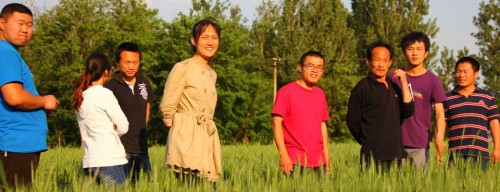



 Alison van Diggelen @FreshDialogues
Alison van Diggelen @FreshDialogues Dana Hull @danahull
Dana Hull @danahull





